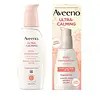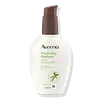What's inside
What's inside
 Key Ingredients
Key Ingredients

 Benefits
Benefits

 Concerns
Concerns

 Ingredients Side-by-side
Ingredients Side-by-side

Titanium Dioxide 4.3%
Cosmetic ColorantZinc Oxide 3%
Cosmetic ColorantWater
Skin ConditioningC12-15 Alkyl Benzoate
AntimicrobialCyclopentasiloxane
EmollientGlycerin
HumectantStyrene/Acrylates Copolymer
Isopropyl Myristate
EmollientCetyl Dimethicone
EmollientOctyldodecyl Neopentanoate
EmollientGlyceryl Behenate
EmollientPEG-100 Stearate
Glyceryl Stearate
EmollientBenzyl Alcohol
PerfumingAluminum Stearate
Cosmetic ColorantArachidyl Alcohol
EmollientEthylhexylglycerin
Skin ConditioningPolyhydroxystearic Acid
EmulsifyingCaprylyl Glycol
EmollientBehenyl Alcohol
EmollientAlumina
AbrasiveHydroxyethyl Acrylate/Sodium Acryloyldimethyl Taurate Copolymer
Emulsion StabilisingXanthan Gum
EmulsifyingCitric Acid
BufferingMethyldihydrojasmonate
MaskingSqualane
EmollientArachidyl Glucoside
EmulsifyingDimethicone
EmollientChlorphenesin
AntimicrobialTriethoxycaprylylsilane
Dipropylene Glycol Dibenzoate
EmollientChrysanthemum Parthenium Flower/Leaf/Stem Juice
AntioxidantPPG-15 Stearyl Ether Benzoate
EmollientAcrylates/Dimethicone Copolymer
Skin ConditioningSodium Citrate
BufferingPolysorbate 60
EmulsifyingAlpha-Isomethyl Ionone
PerfumingMethyl Ionones
MaskingCeramide NP
Skin ConditioningAvena Sativa Kernel Extract
AbrasiveTitanium Dioxide 4.3%, Zinc Oxide 3%, Water, C12-15 Alkyl Benzoate, Cyclopentasiloxane, Glycerin, Styrene/Acrylates Copolymer, Isopropyl Myristate, Cetyl Dimethicone, Octyldodecyl Neopentanoate, Glyceryl Behenate, PEG-100 Stearate, Glyceryl Stearate, Benzyl Alcohol, Aluminum Stearate, Arachidyl Alcohol, Ethylhexylglycerin, Polyhydroxystearic Acid, Caprylyl Glycol, Behenyl Alcohol, Alumina, Hydroxyethyl Acrylate/Sodium Acryloyldimethyl Taurate Copolymer, Xanthan Gum, Citric Acid, Methyldihydrojasmonate, Squalane, Arachidyl Glucoside, Dimethicone, Chlorphenesin, Triethoxycaprylylsilane, Dipropylene Glycol Dibenzoate, Chrysanthemum Parthenium Flower/Leaf/Stem Juice, PPG-15 Stearyl Ether Benzoate, Acrylates/Dimethicone Copolymer, Sodium Citrate, Polysorbate 60, Alpha-Isomethyl Ionone, Methyl Ionones, Ceramide NP, Avena Sativa Kernel Extract
Butyl Methoxydibenzoylmethane 3%
UV AbsorberHomosalate 11.5%
Skin ConditioningEthylhexyl Salicylate 5%
UV AbsorberOctocrylene 3%
UV AbsorberWater
Skin ConditioningC12-15 Alkyl Benzoate
AntimicrobialGlycine Soja Seed Extract
Skin ConditioningDimethicone
EmollientCetearyl Alcohol
EmollientGlycerin
HumectantPhenyl Trimethicone
Skin ConditioningPhenoxyethanol
PreservativeSteareth-2
EmulsifyingSilica
AbrasivePanthenol
Skin ConditioningArachidyl Alcohol
EmollientEthylene/Acrylic Acid Copolymer
Emulsion StabilisingCetearyl Glucoside
EmulsifyingSteareth-21
CleansingParfum
MaskingPolyacrylate-13
Behenyl Alcohol
Emollient1,2-Hexanediol
Skin ConditioningCaprylyl Glycol
EmollientChlorphenesin
AntimicrobialDisodium EDTA
Polyisobutene
Arachidyl Glucoside
EmulsifyingPentaerythrityl Tetra-Di-T-Butyl Hydroxyhydrocinnamate
AntioxidantPolysorbate 20
EmulsifyingTropolone
Skin ConditioningTitanium Dioxide
Cosmetic ColorantMica
Cosmetic ColorantButyl Methoxydibenzoylmethane 3%, Homosalate 11.5%, Ethylhexyl Salicylate 5%, Octocrylene 3%, Water, C12-15 Alkyl Benzoate, Glycine Soja Seed Extract, Dimethicone, Cetearyl Alcohol, Glycerin, Phenyl Trimethicone, Phenoxyethanol, Steareth-2, Silica, Panthenol, Arachidyl Alcohol, Ethylene/Acrylic Acid Copolymer, Cetearyl Glucoside, Steareth-21, Parfum, Polyacrylate-13, Behenyl Alcohol, 1,2-Hexanediol, Caprylyl Glycol, Chlorphenesin, Disodium EDTA, Polyisobutene, Arachidyl Glucoside, Pentaerythrityl Tetra-Di-T-Butyl Hydroxyhydrocinnamate, Polysorbate 20, Tropolone, Titanium Dioxide, Mica
Ingredients Explained
These ingredients are found in both products.
Ingredients higher up in an ingredient list are typically present in a larger amount.
Arachidyl Alcohol is a fatty alcohol made from peanut oil. It is an emollient, emulsifier, and thickener.
You'll most likely find this ingredient as an emulsifier in water-based cosmetics.
We don't have a description for Arachidyl Glucoside yet.
Behenyl Alcohol is a type of fatty alcohol (these are different from the drying, solvent alcohols).
Fatty Alcohols have hydrating properties and are most often used as an emollient or to thicken a product. They are usually derived from natural fats and oils; behenyl alcohol is derived from the fats of vegetable oils.
Emollients help keep your skin soft and hydrated by creating a film that traps moisture in.
In 2000, Behenyl Alcohol was approved by the US as medicine to reduce the duration of cold sores.
Learn more about Behenyl AlcoholC12-15 Alkyl Benzoate is made up of Benzoic Acid and long chain alcohols. It has a low molecular weight.
C12-15 Alkyl Benzoate is an emollient and texture enhancer. Due to its solubility, it is often used in sunscreens to help evenly distribute active ingredients.
As an emollient, C12-15 Alkyl Benzoate helps soften and hydrate your skin. Emollients create a film on your skin that traps moisture within.
This ingredient has been reported to cause eye irritation.
Learn more about C12-15 Alkyl BenzoateCaprylyl Glycol is a humectant and emollient, meaning it attracts and preserves moisture.
It is a common ingredient in many products, especially those designed to hydrate skin. The primary benefits are retaining moisture, skin softening, and promoting a healthy skin barrier.
Though Caprylyl Glycol is an alcohol derived from fatty acids, it is not the kind that can dry out skin.
This ingredient is also used as a preservative to extend the life of products. It has slight antimicrobial properties.
Learn more about Caprylyl GlycolChlorphenesin is a synthetic preservative. It helps protect a product against bacteria in order to extend shelf life. In most cases, Chlorphenesin is paired with other preservatives such as phenoxyethanol and caprylyl glycol.
Chlorphenesin is a biocide. This means it is able to help fight the microorganisms on our skin. It is also able to fight odor-releasing bacteria.
Chlorphenesin is soluble in both water and glycerin.
Studies show Chlorphenesin is easily absorbed by our skin. You should speak with a skincare professional if you have concerns about using Chlorphenesin.
Learn more about ChlorphenesinDimethicone is a type of synthetic silicone created from natural materials such as quartz.
What it does:
Dimethicone comes in different viscosities:
Depending on the viscosity, dimethicone has different properties.
Ingredients lists don't always show which type is used, so we recommend reaching out to the brand if you have questions about the viscosity.
This ingredient is unlikely to cause irritation because it does not get absorbed into skin. However, people with silicone allergies should be careful about using this ingredient.
Note: Dimethicone may contribute to pilling. This is because it is not oil or water soluble, so pilling may occur when layered with products. When mixed with heavy oils in a formula, the outcome is also quite greasy.
Learn more about DimethiconeGlycerin is already naturally found in your skin. It helps moisturize and protect your skin.
A study from 2016 found glycerin to be more effective as a humectant than AHAs and hyaluronic acid.
As a humectant, it helps the skin stay hydrated by pulling moisture to your skin. The low molecular weight of glycerin allows it to pull moisture into the deeper layers of your skin.
Hydrated skin improves your skin barrier; Your skin barrier helps protect against irritants and bacteria.
Glycerin has also been found to have antimicrobial and antiviral properties. Due to these properties, glycerin is often used in wound and burn treatments.
In cosmetics, glycerin is usually derived from plants such as soybean or palm. However, it can also be sourced from animals, such as tallow or animal fat.
This ingredient is organic, colorless, odorless, and non-toxic.
Glycerin is the name for this ingredient in American English. British English uses Glycerol/Glycerine.
Learn more about GlycerinTitanium dioxide is a mineral UV filter widely used in sunscreens and cosmetics.
It is one of only two UV filters officially classified as “mineral” by regulatory agencies, the other being zinc oxide.
Titanium dioxide provides broad-spectrum protection mostly in the UVB and UVAII range, with some protection in the UVAI range.
While its UVA protection isn’t as strong as zinc oxide’s, the difference is minor.
A common myth is that mineral UV filters reflect UV light. However, modern research shows titanium dioxide absorbs UV radiation like chemical filters (~95% absorption & 5% reflection).
Thanks to its non-irritating nature, titanium dioxide is suitable for sensitive, acne-prone, or redness-prone skin. It is unlikely to cause "eye sting" like other sunscreen ingredients.
A major drawback of this ingredient is its white cast and thick texture. This is why mineral sunscreens often leave a white cast and are less cosmetically elegant than chemical/hybrid sunscreens.
To improve white cast and spreadability, micronized or nano-sized titanium dioxide is often used.
There are ongoing concerns surrounding nano-titanium oxide's impact on marine ecosystems.
There is no conclusive evidence that any form of titanium oxide (or any other sunscreen ingredients) will cause harm to marine ecosystems or coral reefs. The science is still developing but many consumers are keeping a close eye on this issue.
Please note, many destinations have reef-safety sunscreen rules. For instance, the U.S. Virgin Islands advises all visitors to use non-nano mineral sunscreens.
Nano mineral sunscreens once raised safety concerns about absorption into skin.
Extensive research has shown that they do not penetrate healthy or damaged skin; they remain safely on the surface and the top layer of dead skin (stratum corneum).
You'll likely find titanium dioxide bundled with alumina, silica, or dimethicone. These ingredients help make titanium dioxide highly photostable; this prevents it from interacting with other formula components under UV light.
Learn more about Titanium DioxideWater. It's the most common cosmetic ingredient of all. You'll usually see it at the top of ingredient lists, meaning that it makes up the largest part of the product.
So why is it so popular? Water most often acts as a solvent - this means that it helps dissolve other ingredients into the formulation.
You'll also recognize water as that liquid we all need to stay alive. If you see this, drink a glass of water. Stay hydrated!
Learn more about Water